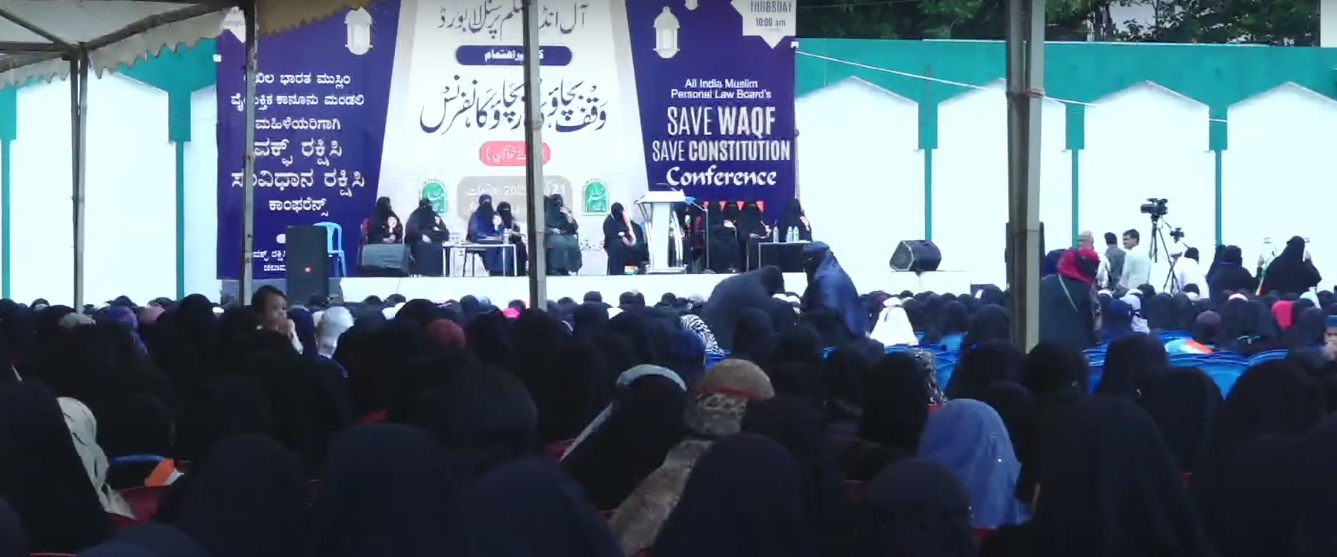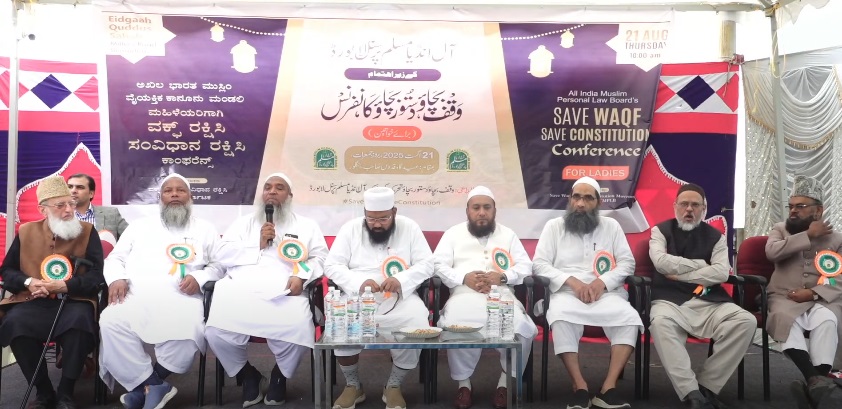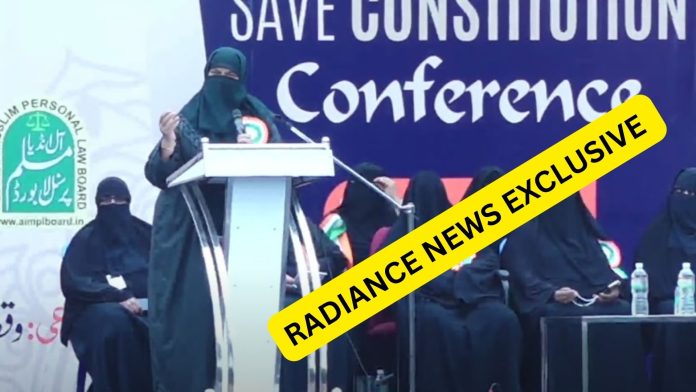Bengaluru: The All India Muslim Personal Law Board (AIMPLB) Women’s Wing organised a major “Waqf Bachao Dastoor Bachao” (Save Waqf Save Constitution) conference in Bengaluru. The gathering brought together thousands of women from across Karnataka and other states, reflecting strong grassroots participation in the campaign. The conference focused on raising awareness about the Waqf (Amendment) Law, its implications for the Muslim community, and the urgent need to protect both religious endowments and constitutional guarantees.
The event was presided over by Maulana Sageer Ahmad Khan Sahab Rashadi, Ameer-e-Shariat Karnataka and Motahmim Darul Uloom Sabeel Rashad, who also serves as the convener of the Save Waqf Save Constitution movement. Prominent guests included AIMPLB leaders and other noted personalities such as Asim Afroze Seth, Maulana Naushad Alam Qasmi, Maulana Abdul Raheem Rashidi, Dr. Saad Belgaumi (President Jamaat-e-Islami Hind Karnataka), and Yusuf Kanni (Secretary JIH Karnataka).
The keynote address was delivered by Jaleesa Sultana Yaseen from Hyderabad, a leading figure in the AIMPLB Women’s Wing. She outlined the legal and political challenges facing Muslims since 2014, highlighting the Triple Talaq legislation, the Citizenship Amendment Act, and the recent Waqf Amendment Law as part of a systematic attempt to undermine Islamic practices. She called the Waqf Amendment Law “extremely oppressive and unjust,” designed to strip Muslims of rights guaranteed under both Sharia and the Indian Constitution.
Jaleesa Sultana strongly refuted claims that Muslims control excessive land resources, noting that the Hindu Endowment Acts in a handful of states cover more land than all Waqf properties in India combined. She criticised provisions in the new law that allow district collectors to seize Waqf land, deny access to courts, and enforce rigid documentation standards not required of other religious institutions. She further pointed to the legalisation of encroachments and the inclusion of non-Muslims on Waqf Boards as measures aimed at eroding Muslim control over their religious affairs.
She also rejected government claims that the law seeks to empower Muslim women and backward Muslims, saying empowerment comes through education and economic opportunities, not through laws that take away religious freedoms. Jaleesa Sultana urged women to play an active role in resisting these changes, warning that the law threatens mosques, Eidgahs, graveyards, madrasas, dargahs, and imambargahs across the country.
Maulana Abu Talib Rahmani, another senior AIMPLB member, expanded the discussion to include broader social concerns. He spoke on the issue of apostasy, stressing the critical role of Muslim mothers in nurturing faith among children. He lamented the rising cases of Muslim daughters being converted and urged mothers to safeguard their children’s beliefs. He also criticised the poor functioning of Waqf Boards under government control, contrasting it with the independent and effective management seen in Gurudwaras and Hindu temples. Rahmani strongly condemned the government’s launch of the Umeed Portal for Waqf registration, calling it “contempt of court,” as the Supreme Court has yet to pronounce its verdict on the Bill.
The final address was given by Maulana Umrain Mahfooz Rahmani, Secretary of AIMPLB. He explained the deep significance of Waqf in Islamic tradition, citing examples from early Islamic history. He highlighted the contributions of Khadija (RA), Aisha (RA), and Malika Zubaida, who dedicated their wealth for the welfare of society through Waqf. He described Waqf as perpetual charity that strengthens communities and preserves Islamic identity.
He declared that Waqf is a religious matter and not merely an administrative concern. He told participants that if defending Waqf is treated as a crime, the community is ready to commit it a thousand times. He called on women to strengthen their faith, maintain modesty, and protect their families’ beliefs. Drawing inspiration from Palestinian women, he said that strong mothers build strong communities and play a decisive role in resistance against oppression.
Despite concerns about the weather, arrangements were extensive and orderly. The program began with a recitation from the Quran by Zikra Maryam, followed by cultural presentations. Azka Nisa presented a poem, Rabia and her group rendered a Hamd, Faqeena Konain recited a Naat, and Tahiyya Tahreem led the AIMPLB anthem. These performances set a spiritual and emotional atmosphere before the speeches began.
The conference concluded with prayers and a pledge by participants to continue supporting AIMPLB’s campaign. Women expressed their resolve to defend Waqf properties, safeguard the Indian Constitution, and preserve Muslim Personal Law. The event marked a significant moment in the growing mobilisation of Muslim women for religious and constitutional rights.






